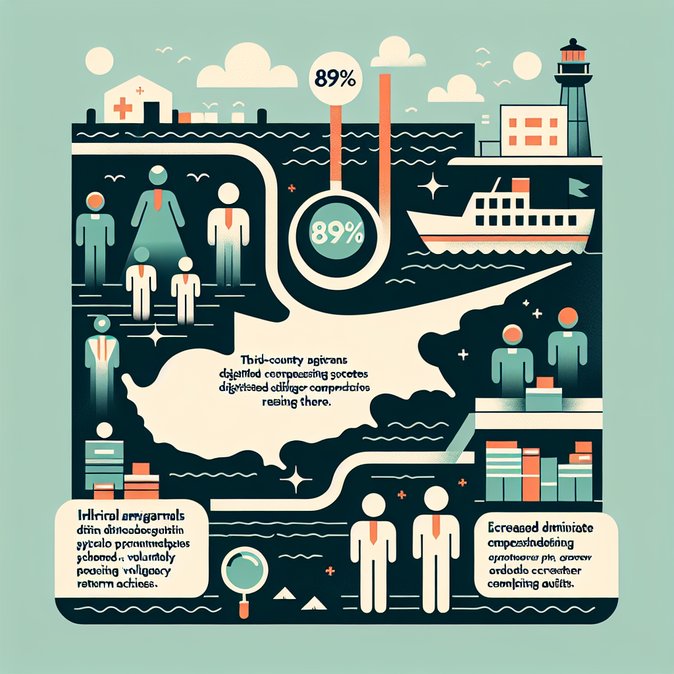
Cyprus won a significant political commitment from Brussels on 11 November when the European Commission confirmed that the island, together with Greece, Spain and Italy, will automatically qualify for support from the new EU “solidarity pool” once the bloc’s Migration & Asylum Pact enters into force in mid-2026. The pool will allow frontline member-states to request either financial contributions or the physical relocation of asylum-seekers to other EU countries whenever arrival numbers exceed agreed thresholds. For Nicosia—currently hosting the highest per-capita share of asylum applicants in the Union—the mechanism promises predictable burden-sharing and could remove much of the political friction that has characterised intra-EU relocation talks over the past decade.
Although the pact itself is still being finalised in trilogue, the Commission’s decision provides businesses and investors with a clearer roadmap for Cyprus’ migration environment. In the short term, companies should not expect immediate quotas to be lifted, but HR teams can prepare streamlined compliance manuals that assume quicker processing of work and family-reunification visas once the solidarity pool unlocks extra capacity in Cyprus’ asylum services. The Ministry of Interior has already hinted that it will redeploy case officers from refugee processing to business immigration once the pact is operational.
![EU Solidarity Pool to Ease Migration Burden on Cyprus Under 2026 Pact]()
The same communication from Brussels included a €250 million EU tender for advanced drone and anti-drone technology to secure the Union’s external borders. Cyprus is widely expected to bid, building on pilot tests at the Green Line and the island’s two international airports. If successful, local defence-tech suppliers could see new procurement contracts and a chance to integrate with EU-wide surveillance platforms—a development that would improve situational awareness for both law-enforcement and civil-aviation stakeholders.
For multinational companies moving staff to Cyprus, these developments offer two practical upsides. First, more predictable asylum processing should free administrative resources and shorten waiting times for residence permits tied to intracompany transfers. Second, better border surveillance is likely to reduce ad-hoc controls at ports and airports that have occasionally disrupted cargo and executive travel. Travel-risk managers should nevertheless monitor implementation timetables, as the drone programme’s first procurement lot will not be delivered until late-2026 at the earliest.
Finally, the decision dovetails with Cyprus’ ambition to join the Schengen Area in 2026. Alignment of border-management standards is a prerequisite for Schengen accession, and the solidarity pool—combined with new surveillance assets—will strengthen the island’s technical credentials. Corporates planning regional hubs in Nicosia or Limassol therefore gain added confidence that Cyprus will soon offer passport-free travel to 29 European markets.
Although the pact itself is still being finalised in trilogue, the Commission’s decision provides businesses and investors with a clearer roadmap for Cyprus’ migration environment. In the short term, companies should not expect immediate quotas to be lifted, but HR teams can prepare streamlined compliance manuals that assume quicker processing of work and family-reunification visas once the solidarity pool unlocks extra capacity in Cyprus’ asylum services. The Ministry of Interior has already hinted that it will redeploy case officers from refugee processing to business immigration once the pact is operational.

The same communication from Brussels included a €250 million EU tender for advanced drone and anti-drone technology to secure the Union’s external borders. Cyprus is widely expected to bid, building on pilot tests at the Green Line and the island’s two international airports. If successful, local defence-tech suppliers could see new procurement contracts and a chance to integrate with EU-wide surveillance platforms—a development that would improve situational awareness for both law-enforcement and civil-aviation stakeholders.
For multinational companies moving staff to Cyprus, these developments offer two practical upsides. First, more predictable asylum processing should free administrative resources and shorten waiting times for residence permits tied to intracompany transfers. Second, better border surveillance is likely to reduce ad-hoc controls at ports and airports that have occasionally disrupted cargo and executive travel. Travel-risk managers should nevertheless monitor implementation timetables, as the drone programme’s first procurement lot will not be delivered until late-2026 at the earliest.
Finally, the decision dovetails with Cyprus’ ambition to join the Schengen Area in 2026. Alignment of border-management standards is a prerequisite for Schengen accession, and the solidarity pool—combined with new surveillance assets—will strengthen the island’s technical credentials. Corporates planning regional hubs in Nicosia or Limassol therefore gain added confidence that Cyprus will soon offer passport-free travel to 29 European markets.


